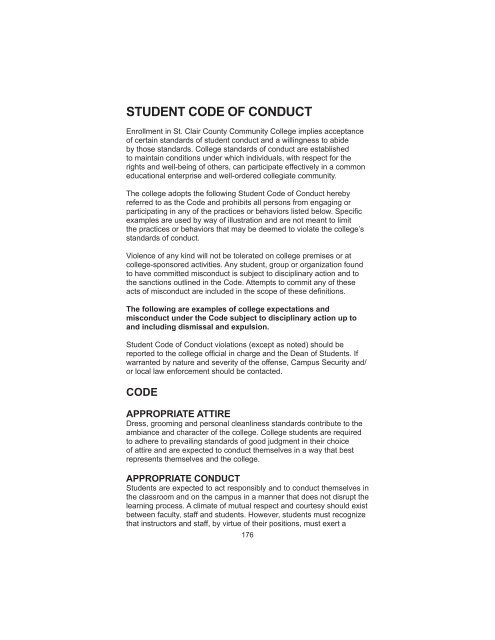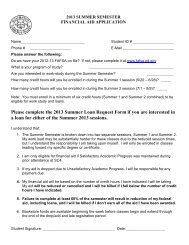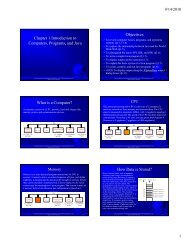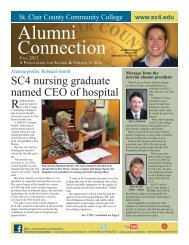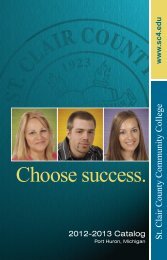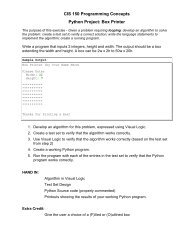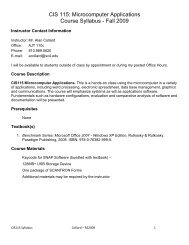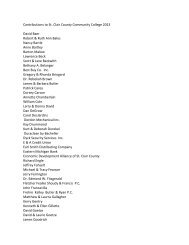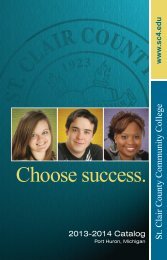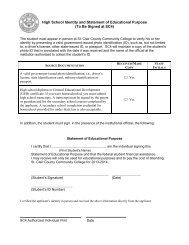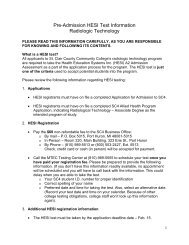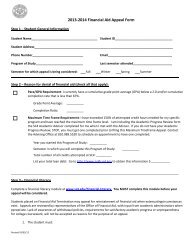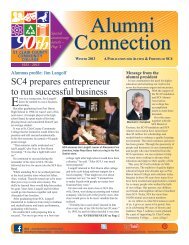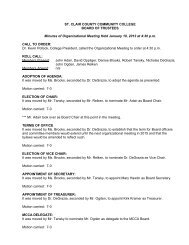student code of conduct - St. Clair County Community College
student code of conduct - St. Clair County Community College
student code of conduct - St. Clair County Community College
You also want an ePaper? Increase the reach of your titles
YUMPU automatically turns print PDFs into web optimized ePapers that Google loves.
STUDENT CODE OF CONDUCT<br />
Enrollment in <strong>St</strong>. <strong>Clair</strong> <strong>County</strong> <strong>Community</strong> <strong>College</strong> implies acceptance<br />
<strong>of</strong> certain standards <strong>of</strong> <strong>student</strong> <strong>conduct</strong> and a willingness to abide<br />
by those standards. <strong>College</strong> standards <strong>of</strong> <strong>conduct</strong> are established<br />
to maintain conditions under which individuals, with respect for the<br />
rights and well-being <strong>of</strong> others, can participate effectively in a common<br />
educational enterprise and well-ordered collegiate community.<br />
The college adopts the following <strong>St</strong>udent Code <strong>of</strong> Conduct hereby<br />
referred to as the Code and prohibits all persons from engaging or<br />
participating in any <strong>of</strong> the practices or behaviors listed below. Specific<br />
examples are used by way <strong>of</strong> illustration and are not meant to limit<br />
the practices or behaviors that may be deemed to violate the college’s<br />
standards <strong>of</strong> <strong>conduct</strong>.<br />
Violence <strong>of</strong> any kind will not be tolerated on college premises or at<br />
college-sponsored activities. Any <strong>student</strong>, group or organization found<br />
to have committed mis<strong>conduct</strong> is subject to disciplinary action and to<br />
the sanctions outlined in the Code. Attempts to commit any <strong>of</strong> these<br />
acts <strong>of</strong> mis<strong>conduct</strong> are included in the scope <strong>of</strong> these definitions.<br />
The following are examples <strong>of</strong> college expectations and<br />
mis<strong>conduct</strong> under the Code subject to disciplinary action up to<br />
and including dismissal and expulsion.<br />
<strong>St</strong>udent Code <strong>of</strong> Conduct violations (except as noted) should be<br />
reported to the college <strong>of</strong>ficial in charge and the Dean <strong>of</strong> <strong>St</strong>udents. If<br />
warranted by nature and severity <strong>of</strong> the <strong>of</strong>fense, Campus Security and/<br />
or local law enforcement should be contacted.<br />
CODE<br />
APPROPRIATE ATTIRE<br />
Dress, grooming and personal cleanliness standards contribute to the<br />
ambiance and character <strong>of</strong> the college. <strong>College</strong> <strong>student</strong>s are required<br />
to adhere to prevailing standards <strong>of</strong> good judgment in their choice<br />
<strong>of</strong> attire and are expected to <strong>conduct</strong> themselves in a way that best<br />
represents themselves and the college.<br />
APPROPRIATE CONDUCT<br />
<strong>St</strong>udents are expected to act responsibly and to <strong>conduct</strong> themselves in<br />
the classroom and on the campus in a manner that does not disrupt the<br />
learning process. A climate <strong>of</strong> mutual respect and courtesy should exist<br />
between faculty, staff and <strong>student</strong>s. However, <strong>student</strong>s must recognize<br />
that instructors and staff, by virtue <strong>of</strong> their positions, must exert a<br />
176
measure <strong>of</strong> authority in the classroom and other campus areas.<br />
<strong>St</strong>udents should respect this authority. Disciplinary problems may<br />
result in a <strong>student</strong> being withdrawn from class and, in extreme cases,<br />
dismissed from the college.<br />
DISORDERLY CONDUCT<br />
Disorderly <strong>conduct</strong> is prohibited and is defined as acting in a manner<br />
to annoy, disturb, interfere with, obstruct or be <strong>of</strong>fensive to others,<br />
including but not limited to shouting or making excessive noise either<br />
inside or outside a building to the annoyance or disturbance <strong>of</strong> others;<br />
verbally abusing college <strong>of</strong>ficials (either on the phone, in person or via<br />
electronic communications) acting in performance <strong>of</strong> their duties; acting<br />
in a lewd or indecent manner; making threats; harassing others.<br />
ASSAULT AND THREATS<br />
Assault and threats are prohibited, and include, but are not limited<br />
to, the following: committing physical abuse and/or battery or other<br />
behavior resulting in harm to any person; placing a person in fear <strong>of</strong><br />
imminent physical danger or injury; making threats or engaging in<br />
behavior to harm self or others.<br />
CLASSROOM AND LABORATORY SAFETY<br />
VIOLATIONS<br />
<strong>St</strong>udents must abide by classroom safety regulations. Safety glasses,<br />
headgear, aprons, lab coats, earplugs and other appropriate safety<br />
equipment may be needed by all <strong>student</strong>s in specific courses.<br />
DISCRIMINATION AND HARASSMENT<br />
Discrimination and harassment are strictly forbidden on campus and in<br />
all college affiliated activities. Discrimination and harassment include<br />
inappropriate and <strong>of</strong>fensive <strong>conduct</strong> against any person, <strong>student</strong> or<br />
staff member on the basis <strong>of</strong> race, color, religion, gender, national<br />
origin, creed, ancestry, familial status, age, disability, marital status,<br />
height, weight, sexual orientation or other protected status. Modes <strong>of</strong><br />
contact or communication include, but are not limited to, in person, in<br />
writing, through telephone, electronic mail or instant messaging.<br />
Any form <strong>of</strong> harassment is unacceptable at <strong>St</strong>. <strong>Clair</strong> <strong>County</strong> <strong>Community</strong><br />
<strong>College</strong>, and complaints or charges will be followed through with<br />
appropriate action. SC4 employees and <strong>student</strong>s are individually<br />
responsible to ensure such harassment does not occur. Concerns<br />
should be directed to the Human Resources <strong>of</strong>fice, Room 203, Main<br />
Building.<br />
177
SEXUAL HARASSMENT<br />
Sexual harassment or related retaliation is strictly prohibited on<br />
campus and in college affiliated activities. Prohibited <strong>conduct</strong> includes,<br />
but is not limited to, unwelcome verbal or physical acts that are<br />
sexual in nature, unrelated to the content or context, and sufficiently<br />
severe and/or pervasive as to objectively either (a) have the effect<br />
<strong>of</strong> unreasonably interfering with an individual’s work or academic<br />
performance, or (b) create an intimidating, hostile or <strong>of</strong>fensive learning<br />
or working environment. Sexual harassment includes, but is not limited<br />
to, sexually based unwelcome verbal remarks or physical advances,<br />
request for sexual favors, inappropriate and unwelcome contact, and<br />
explicitly or implicitly stating that submission or rejection <strong>of</strong> sexual<br />
acts or advances will be a factor in one’s employment, participation or<br />
evaluation within the <strong>College</strong> and/or its activities.<br />
Any form <strong>of</strong> harassment is unacceptable at <strong>St</strong>. <strong>Clair</strong> <strong>County</strong> <strong>Community</strong><br />
<strong>College</strong>, and complaints or charges will be followed through with<br />
appropriate action. SC4 employees and <strong>student</strong>s are individually<br />
responsible to ensure such harassment does not occur. Concerns<br />
should be directed to the Human Resources Office, Room 203, Main<br />
Building.<br />
DISHONESTY – ACADEMIC<br />
The college considers academic honesty to be essential to all<br />
academic performance. Instances <strong>of</strong> academic dishonesty will be<br />
treated as serious <strong>of</strong>fenses <strong>of</strong> the <strong>St</strong>udent Code <strong>of</strong> Conduct. <strong>St</strong>udents<br />
involved in activities such as cheating and/or plagiarism will be subject<br />
to disciplinary action up to and including dismissal.<br />
• Definition <strong>of</strong> plagiarism: Plagiarism is the appropriation <strong>of</strong><br />
language, thoughts or ideas <strong>of</strong> another author and claiming that<br />
as one’s own. Plagiarism is work not produced by the <strong>student</strong>, or<br />
work that does not credit borrowings from the original source(s).<br />
• Definition <strong>of</strong> cheating: Cheating can be, but is not limited to,<br />
a <strong>student</strong> using electronic technology, notes or other written<br />
materials not permitted by the instructor; looking at other<br />
<strong>student</strong>s’ papers without the instructor’s permission; requesting<br />
answers from other <strong>student</strong>s; or working with other <strong>student</strong>s when<br />
independent work is required. Situations where cheating may<br />
occur are during tests, exams, quizzes or other similar methods<br />
<strong>of</strong> evaluation.<br />
When the instructor has sufficient evidence <strong>of</strong> cheating or plagiarism,<br />
the instructor may impose disciplinary actions such as assigning a<br />
failing grade to the <strong>student</strong>’s assignment, quiz, paper or test.<br />
178
If the plagiarism or cheating involves major course work such as<br />
plagiarizing a research paper or cheating on a final exam, the instructor<br />
may fail the <strong>student</strong> in the course.<br />
DISHONESTY – NON-ACADEMIC<br />
Non-academic dishonesty includes, but is not limited to:<br />
• Furnishing false information to the college or college personnel,<br />
including Campus Security.<br />
• Furnishing false information at disciplinary proceedings.<br />
• Forgery; unauthorized alteration or unauthorized use <strong>of</strong> any<br />
college documents, records or identification cards, including<br />
computer records; and misuse <strong>of</strong> computer facilities and<br />
electronic mailing systems.<br />
• Giving false or incomplete replies to questions, verbal or written,<br />
on applications, forms or other documents required by properly<br />
authorized representatives <strong>of</strong> the college.<br />
DRUG AND ALCOHOL VIOLATION<br />
Intoxication; drug−altered states; and the possession, use or sale <strong>of</strong><br />
alcohol, illegal drugs or related paraphernalia; are strictly forbidden on<br />
campus or at or as part <strong>of</strong> any college affiliated activity. This prohibition<br />
includes, but is not limited to: possession <strong>of</strong> paraphernalia containing<br />
drug residue; and manufacture or distribution <strong>of</strong> illegal drugs or<br />
controlled substances. If <strong>student</strong>s are experiencing problems with<br />
drugs and/or alcohol, they should contact Advising, Room 120,<br />
Acheson Technology Center, or call (810) 989-5520.<br />
FIRE/FALSE ALARM/REPORT<br />
Knowingly or negligently causing or attempting to cause a fire in a<br />
college building; and initiating or causing to be initiated any false alarm/<br />
report, warning, or threat <strong>of</strong> fire, explosion or other emergency is<br />
prohibited.<br />
GAMBLING<br />
It is the policy <strong>of</strong> the college to prohibit gambling on the college<br />
campus. Except as hereinafter provided, the college prohibits the sale,<br />
solicitation or promotion <strong>of</strong> a game <strong>of</strong> chance, including, but not limited<br />
to lotteries, raffles, bingo or similar other activities on college premises<br />
or which use the college’s name in any way. The Board authorizes the<br />
President <strong>of</strong> the college to waive this prohibition for such fundraising<br />
activities which support <strong>student</strong> services or scholarships and which<br />
comply with any applicable laws and license requirements. The<br />
President may establish procedures and guidelines for applying for this<br />
waiver.<br />
179
GIVING FALSE INFORMATION<br />
No person shall give false or incomplete replies to questions, verbal or<br />
written, on applications, forms or other documents required by properly<br />
authorized representatives <strong>of</strong> the college.<br />
HAZING<br />
Any act <strong>of</strong> hazing is prohibited. Hazing is defined as any action taken<br />
or situation created intentionally, with or without consent, whether on or<br />
<strong>of</strong>f campus, to produce mental or physical discomfort, embarrassment,<br />
harassment or ridicule.<br />
INTERFERING WITH EVENTS<br />
Interfering with any normal college or college−sponsored events is<br />
prohibited and includes, but is not limited to, disruption <strong>of</strong> studying,<br />
teaching, research, administration, and fire, police or emergency<br />
services.<br />
LEWD BEHAVIOR<br />
Behavior that is lewd or indecent is prohibited. Such behavior is<br />
defined in consideration <strong>of</strong> the general standards <strong>of</strong> acceptable<br />
behavior and includes, but is not limited to, the following: obscene<br />
remarks, gestures or other communications; exposing oneself in an<br />
indecent manner; entering restrooms against the gender designation;<br />
viewing pornographic images; or engaging in sexual activities on the<br />
campus.<br />
MISUSE, THEFT OF FIRE SAFETY OR<br />
EMERGENCY EQUIPMENT<br />
Misuse, tampering, theft or damage to fire safety equipment such<br />
as fire extinguishers, exit signs, first aid kits, automated external<br />
defibrillators (AEDs) or other emergency supplies on campus is<br />
prohibited.<br />
NON-COMPLIANCE<br />
Failure to comply with reasonable directions <strong>of</strong> college <strong>of</strong>ficials,<br />
including college security <strong>of</strong>ficers, faculty and staff acting in<br />
performance <strong>of</strong> their duties is prohibited. Directives to cooperate in<br />
the administration <strong>of</strong> the Code including those to appear and give<br />
testimony at a college disciplinary proceeding, as well as directives to<br />
produce identification are included in the scope <strong>of</strong> this provision.<br />
REGULATION VIOLATION<br />
Any violation <strong>of</strong> other published regulations including, but not limited to,<br />
SC4 policies as listed in this catalog is considered a Code violation.<br />
180
SANCTION VIOLATION<br />
Violating the terms <strong>of</strong> any disciplinary sanction imposed in accordance<br />
with the Code is a Code violation.<br />
SEXUAL ASSAULT<br />
Inflicting any sexual invasion/assault upon any person without that<br />
person’s consent is prohibited. “Consent” requires actual words or<br />
<strong>conduct</strong> indicating a freely-given agreement to have sexual intercourse,<br />
or to participate in sexual activities. The college community should<br />
be aware that, depending on the particular circumstances, previous<br />
sexual relationships or current relationship between the persons<br />
involved, or silence, or lack <strong>of</strong> protest do not necessarily constitute<br />
consent. Further, the degree <strong>of</strong> impairment <strong>of</strong> a person’s ability to<br />
give or withhold consent (including, but not limited to, incapacity or<br />
helplessness caused by alcohol or any other drugs) may be introduced<br />
as pertinent information at any college disciplinary hearing.<br />
SMOKING ON CAMPUS<br />
Smoking is prohibited in all campus buildings, vehicles and outside<br />
areas <strong>of</strong> the campus where non-smokers cannot avoid exposure to<br />
smoke.<br />
Specifically, smoking is prohibited up to 20 feet outside any enclosed<br />
area to ensure that secondhand smoke does not enter the area<br />
through entrances, windows, ventilation systems or any other means.<br />
SOLICITATION<br />
In order to provide an environment that is conducive to teaching and<br />
learning, it has been determined by SC4 to prohibit outside persons<br />
from operating or distributing materials or items on the college campus.<br />
Any problems should be reported to Campus Patrol. Specifically:<br />
1. Selling, soliciting and advertising are prohibited unless an<br />
exception has been authorized by the Office <strong>of</strong> the Vice<br />
President for Administrative Services.<br />
2. Distribution <strong>of</strong> handbills on vehicles on college property is<br />
prohibited.<br />
TECHNOLOGY<br />
Computers and Internet Services – Acceptable Use Policy<br />
2013<br />
<strong>St</strong>. <strong>Clair</strong> <strong>County</strong> <strong>Community</strong> <strong>College</strong> provides computer, Internet<br />
and email services to support research and education to fulfill the<br />
mission <strong>of</strong> the college. These unique resources enrich the learning and<br />
instructional process and foster opportunities for collaborative work<br />
among college <strong>student</strong>s and staff.<br />
181
Privileges: Access to the college’s computer services, including the<br />
Internet, is a privilege granted to <strong>student</strong>s, faculty, staff and the public.<br />
Individual users, including public patrons, are to act responsibly,<br />
respect the rights <strong>of</strong> other users, and respect the integrity <strong>of</strong> the<br />
systems and related physical resources. The college reserves the<br />
right to limit, restrict or extend computing privileges and access<br />
to its information resources.Users and providers inherit privileges<br />
and obligations defined by several authorities:<br />
• Law (such as international copyright law, the U.S. Constitution,<br />
federal communications regulations, federal educational<br />
regulations and Michigan laws)<br />
• <strong>College</strong> policies (such as policies on plagiarism and harassment)<br />
• Service-provider requirements (typically specifying addresses,<br />
protocols, quotas and other technical standards)<br />
• Contracts (including licenses, warranties, service level<br />
agreements, memoranda <strong>of</strong> understanding and agreements with<br />
telecommunications services)<br />
Inappropriate use will result in denial or cancellation <strong>of</strong> that privilege.<br />
<strong>St</strong>. <strong>Clair</strong> <strong>County</strong> <strong>Community</strong> <strong>College</strong> reserves the right to monitor<br />
Internet use and determine if specific uses are consistent with the<br />
acceptable use practices. The college further reserves the right to deny<br />
access to prevent unauthorized or unacceptable activity, and could<br />
involve disciplinary action.<br />
Uses: Faculty, staff and <strong>student</strong>s may use the college’s computing<br />
resources only for purposes related to their studies, their<br />
responsibilities for providing instruction, the discharge <strong>of</strong> their duties as<br />
employees, their <strong>of</strong>ficial business with the college, and other<br />
college-sanctioned or authorized activities. Public users are expected<br />
to use the computers for research and educational pursuits.<br />
Restrictions: Use <strong>of</strong> the Internet for viewing, sending or retrieving<br />
any <strong>of</strong> the following are prohibited:<br />
• Pornographic material or inappropriate text files in violation <strong>of</strong><br />
Michigan criminal laws, including, but not limited to, Michigan<br />
obscenity laws MCLA 752.361-752.374 and other Michigan<br />
statutes and cases concerning obscenity<br />
• Libel or slander<br />
• Deliberately wasting or overloading computing resources, such<br />
as printing too many copies <strong>of</strong> a document<br />
• Fraud or misrepresentation<br />
• Commercial or for-pr<strong>of</strong>it purposes<br />
• Games or gambling<br />
• Personal and private enterprise<br />
182
• Personal advertisement or political lobbying<br />
• The modification or misrepresentation <strong>of</strong> files, data and/or<br />
passwords belonging to others<br />
• Use <strong>of</strong> the college’s trademarks, logos, insignia or copyrights<br />
without prior approval<br />
• Development or use <strong>of</strong> unapproved mailing lists<br />
• Academic dishonesty, including plagiarism<br />
• Violation <strong>of</strong> s<strong>of</strong>tware license agreements<br />
• Actions that would destroy, modify or abuse hardware and<br />
s<strong>of</strong>tware<br />
• Infiltration <strong>of</strong> a computer or computing system for any reason<br />
• Forged electronic mail to make it appear as though it originated<br />
from a different person<br />
• Electronic mail that is abusive, threatening, or for sexual, ethnic,<br />
religious, minority or other forms <strong>of</strong> harassment<br />
• Material that is posted or sent that is contrary to the mission or<br />
values <strong>of</strong> the college<br />
• Electronic mail that menaces or harasses an individual or<br />
individuals<br />
Such actions include, but are not limited to:<br />
• Sending or forwarding chain letters or email that uses a pyramid<br />
scheme to distribute communications to an exponentially<br />
growing collection <strong>of</strong> recipients<br />
• Deliberately flooding a user’s mailbox with automatically<br />
generated mail<br />
• Sending mail that is deliberately designed to interfere with proper<br />
mail delivery or access<br />
• Other acts forbidden by federal or state law<br />
• Attempting, successfully or not, to gain access to another<br />
person’s email files<br />
• Intentional distribution <strong>of</strong> computer viruses<br />
• Anything contrary to the college’s board policy<br />
All users are to abide by the 1976 United <strong>St</strong>ates Copyright Law and the<br />
Digital Millennium Copyright Act when using the Internet. Users must<br />
respect the legal protection applied to programs, data, photographs,<br />
music, written documents and other material as provided by copyright,<br />
trademark, patent, licensure and other proprietary rights mechanisms.<br />
Peer-to-peer (P2P) file sharing applications allow network users to<br />
download and share audio, video and picture files with each other for<br />
legitimate academic endeavors. Use <strong>of</strong> P2P file sharing applications for<br />
the unauthorized acquisition or distribution <strong>of</strong> copyrighted or licensed<br />
material by SC4 network users is prohibited on any SC4 college<br />
computer or the college’s network and may subject a <strong>student</strong> to civil<br />
and criminal liabilities.<br />
183
Copyright infringement is the act <strong>of</strong> exercising, without permission<br />
or legal authority, one or more <strong>of</strong> the exclusive rights granted to the<br />
copyright owner under section 106 <strong>of</strong> the Copyright Act (Title 17 <strong>of</strong> the<br />
United <strong>St</strong>ates Code). These rights include the right to reproduce or<br />
distribute a copyrighted work. In the file-sharing context, downloading<br />
or uploading substantial parts <strong>of</strong> a copyrighted work without authority<br />
constitutes an infringement.<br />
Penalties for copyright infringement include civil and criminal penalties.<br />
In general, anyone found liable for civil copyright infringement may be<br />
ordered to pay either actual damages or “statutory” damages affixed<br />
at not less than $750 and not more than $30,000 per work infringed.<br />
For “willful” infringement, a court may award up to $150,000 per work<br />
infringed. A court can, in its discretion, also assess costs and attorneys’<br />
fees. For details, see Title 17, United <strong>St</strong>ates Code, Sections 504, 505.<br />
Willful copyright infringement also can result in criminal penalties,<br />
including imprisonment <strong>of</strong> up to five years and fines <strong>of</strong> up to $250,000<br />
per <strong>of</strong>fense.<br />
There are a number <strong>of</strong> legal alternatives to illegal downloading<br />
or otherwise acquiring copyrighted material. For a listing <strong>of</strong> these<br />
alternatives, visit www.campusdownloading.com.<br />
The college recognizes that electronic communications and computer<br />
resources are no different than any other form <strong>of</strong> communication or<br />
resource available at the college. Users <strong>of</strong> this medium are bound by<br />
but not limited to:<br />
• Federal, state and local laws<br />
• Compliance with all college policies regarding sexual, racial and<br />
other forms <strong>of</strong> harassment<br />
• Contractual obligations<br />
• All policies <strong>of</strong> the Board <strong>of</strong> Trustees<br />
Alleged violations will be processed according to college policies and<br />
procedures.<br />
Misuse <strong>of</strong> computing, networking or information resources may result<br />
in the loss <strong>of</strong> computing and/or network access. Additionally, misuse<br />
can be prosecuted under applicable statutes. Users may be held<br />
accountable for their <strong>conduct</strong> under any applicable college policies,<br />
procedures or employee contracts. Illegal production <strong>of</strong> s<strong>of</strong>tware<br />
and other intellectual property protected by U.S. copyright law is<br />
subject to civil damages and criminal punishment including fines and<br />
imprisonment.<br />
The college disclaims liability due to losses due to technology failures,<br />
due to intruders (viruses, worms, hackers, etc.) or due to freaks <strong>of</strong><br />
nature.<br />
184
Users should use all available methods to protect their files, including<br />
the frequent changing <strong>of</strong> their passwords, encryption <strong>of</strong> data and use <strong>of</strong><br />
available campus network storage.<br />
The college makes every attempt to maximize security <strong>of</strong> its computer<br />
systems. In the event that data have been corrupted as a result <strong>of</strong><br />
intrusion, the college’s Office <strong>of</strong> Information Technology should be<br />
notified immediately. Every reasonable attempt will be made to restore<br />
files to their status prior to intrusion; HOWEVER, THE OFFICE OF<br />
INFORMATION TECHNOLOGY CANNOT GUARANTEE FULL<br />
RESTORATION.<br />
THEFT OR DAMAGE TO PROPERTY<br />
No person or persons shall steal or damage property belonging to<br />
another person, organization or institution. This includes tampering with<br />
coin operated machines. Violators may be handled by the local police,<br />
the college disciplinary process, or both.<br />
• Theft: Theft <strong>of</strong> property or <strong>of</strong> services, or knowing possession <strong>of</strong><br />
stolen property.<br />
• Destruction <strong>of</strong> Property: Destroying or damaging college<br />
property, such as library holdings or the property <strong>of</strong> others.<br />
UNAUTHORIZED ACCESS OR USE OF COLLEGE<br />
FACILITIES<br />
<strong>St</strong>udents and members <strong>of</strong> the public are not allowed in campus<br />
buildings or facilities after the building has been closed and locked to<br />
<strong>student</strong> and public access. Access to locked buildings requires <strong>of</strong>ficial<br />
permission from an authorized college representative and notification<br />
<strong>of</strong> Campus Patrol. <strong>St</strong>udents in secured buildings after closing must<br />
be under the supervision <strong>of</strong> an authorized college <strong>of</strong>ficial such as<br />
an <strong>of</strong>ficial club advisor, coach, faculty member or appropriate staff<br />
member.<br />
UNAUTHORIZED USE OF THE COLLEGE’S NAME<br />
Any unauthorized commercial use <strong>of</strong> the college’s name, logo or other<br />
representation, or undertaking any unauthorized action in the name <strong>of</strong><br />
the college are prohibited.<br />
VIOLATION OF LAW<br />
Violation <strong>of</strong> federal and/or local law, including, but not limited to,<br />
possession <strong>of</strong> any falsified identification or the manufacture, sale or<br />
distribution <strong>of</strong> local, state or federal identification.<br />
WEAPON/EXPLOSIVE VIOLATION<br />
The use, possession, storage or bringing into a building or class <strong>of</strong> any<br />
firearms, ammunition, knives, other weapons or objects that could be<br />
185
construed as weapons is strictly forbidden. Items that pose a potential<br />
hazard to the safety or health <strong>of</strong> others (such as explosives in any<br />
form) also are prohibited.<br />
SANCTIONS<br />
The college’s policy is directed toward imposing more severe<br />
disciplinary sanctions based on the nature <strong>of</strong> the case. The college<br />
seeks to preserve flexibility in the imposition <strong>of</strong> sanctions so that<br />
each <strong>student</strong> or group <strong>of</strong>fender is afforded the greatest possibility for<br />
appropriate and just treatment. Significant mitigating or aggravating<br />
factors shall be considered, which may include the current demeanor<br />
and the presence or lack <strong>of</strong> a disciplinary or criminal record <strong>of</strong> the<br />
<strong>of</strong>fender, as well as the nature <strong>of</strong> the <strong>of</strong>fense and the extent <strong>of</strong> any<br />
damage, injury or harm resulting from it.<br />
Sanctions may include:<br />
Verbal Warning − Reported verbal reprimand.<br />
Censure − An <strong>of</strong>ficial written reprimand for violation <strong>of</strong> specified<br />
regulations, including a warning that continuation or repetition <strong>of</strong><br />
prohibited <strong>conduct</strong> will be cause for disciplinary action.<br />
Disciplinary Probation −The college may limit and/or monitor <strong>student</strong><br />
participation in academic, privileged or extracurricular activities for a<br />
specified period <strong>of</strong> time. Violation <strong>of</strong> the terms <strong>of</strong> disciplinary probation<br />
may result in suspension or expulsion from the college.<br />
Suspension − Exclusion from classes and other privileges or activities,<br />
including access to college premises or college−sponsored activities <strong>of</strong>f<br />
campus, as set forth in the notice <strong>of</strong> suspension, for a specified period<br />
<strong>of</strong> time. Any <strong>student</strong> who is suspended shall not be entitled to any<br />
tuition or fee refund and is barred from college premises in accordance<br />
with the suspension.<br />
Expulsion − Termination <strong>of</strong> <strong>student</strong> status and exclusion from college<br />
privileges and activities, including access to college premises or<br />
college − sponsored activities <strong>of</strong>f campus, in perpetuity. Any <strong>student</strong><br />
who is expelled shall not be entitled to any tuition or fee refund and is<br />
barred from college premises.<br />
Restitution − Repayment to the college or to an affected party for<br />
damages, loss or injury resulting from a violation <strong>of</strong> the Code.<br />
Other Sanctions − Other sanctions may be imposed instead <strong>of</strong> or<br />
in addition to those specified above. For example, <strong>student</strong>s may be<br />
186
subject to restrictions upon or denials for college parking privileges for<br />
violations involving the use or registration <strong>of</strong> motor vehicles on campus.<br />
Service projects also may be assigned. <strong>St</strong>udents may be directed to<br />
have no contact with other <strong>student</strong>s and/or may be forbidden to access<br />
specified areas <strong>of</strong> campus.<br />
DUE PROCESS<br />
The Due Process system defines the procedure to be applied to<br />
instances in which a <strong>student</strong> charged with noncompliance with<br />
college rules and regulations (<strong>St</strong>udent Code <strong>of</strong> Conduct) objects to<br />
the discipline decision rendered by a college <strong>of</strong>ficial. The complete<br />
procedure is available from the Dean <strong>of</strong> <strong>St</strong>udents, Room 208, Main<br />
Building and online.<br />
187


